|
|
|
Europe and North Asia Forest Law Enforcement and Governance
6-8 June, 2005 Moscow, Russia
|
|
|
|
|
|
IISD's SUMMARY REPORT
is available
online in the following formats:
|
|
|
|
|
The final day of the ENA FLEG Preparatory Conference focused on two draft texts: "The Structure of the St. Petersburg Declaration" and "Elements for the ENA FLEG Indicative List of Actions." Both texts were drafted by the Co-facilitators and will serve as the basis for government and non-governmental stakeholder deliberations in the run up to the ENA FLEG Ministerial Conference.
Two groups met separately in the morning, one composed of government delegates and the other of industry, civil society and other stakeholders, to discuss both texts. Participants met in a joint morning plenary session to review the outcomes of the two group discussions, and hear closing statements from Industry, Civil Society, and other stakeholder groups. In the afternoon, Co-facilitators Jag Maini and Jürgen Blaser summarized the deliberations of the Preparatory Conference, and explained the next steps to prepare a draft Ministerial Declaration and Indicative Action Plan. The Co-facilitators also outlined the preparation process and timeline for the documents, leading to their consideration during the ENA FLEG Ministerial Conference in December 2005. |
|
| Issues Consolidation |
|
On Wednesday morning, two draft texts prepared overnight by the conference co-facilitators were distributed to participants: “The Structure of the St. Petersburg Declaration” and “Elements for the ENA FLEG Indicative List of Actions.” The conference then broke into two discussion groups, one for government delegates and another for industry, civil society and other stakeholders. |
| |
| Goverment delegates |
| |
Facilitators Evgeny Kuzmichev, FOREST Project, Russia, and Jag Maini, Consultant, Canada, and Nalin Kishor, World Bank |
|
Jag Maini presented the papers, and asked for comments, noting that the texts tabled were “skeleton” in form, containing key points that will be redrafted into a flowing text at a later stage. Delegates commented on the papers and made structural and textual proposals and additions.
|
|
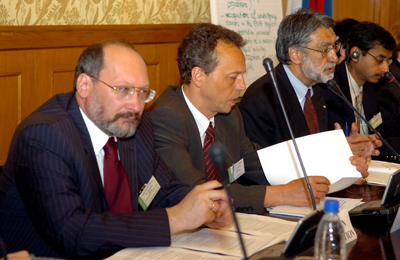 |
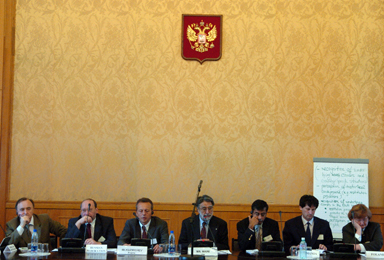 |
| |
|
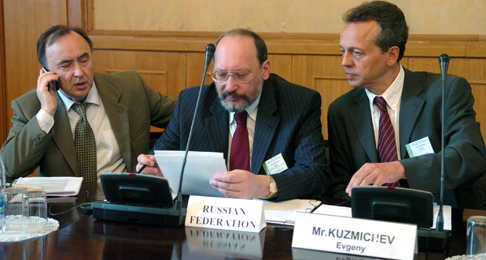 |
|
| |
Valery
Roshupkin, Head of Federal Forestry Agency, Russian Ministry of Natural Resources, Nikita Bantsekin, Russian Ministry of Natural Resources, and Evgeny Kuzmichev, Forest Project, Russia
Governments' proposals on the indicative list of actions paper included: having a short preamble; detailing the data required; creating transparent databases on forest users; financial support for databases; adding forest inventories; referring to mechanisms for protecting competition; strengthening the rule of law; elaborating trade incentives to ensure legality; spelling out certification procedures; promoting an enabling climate to attract private investment; and referencing forest rights of indigenous peoples. |
| |
| |
Kenji Nagatomo, Japan (left), Ya Adiya, Mongolia and Mihail Coca, Moldova (center) and Zhang Lei, China |
| |
Milanka Jovanovic, Bosnia and Herzegovina (left)
and other government delegates deliberate papers on the structure of the St. Petersburg Declaration and indicative list of actions
|
Jovica Ristovski, Macedonia, and Valdas Vaiciunas, Lithuania (left) and Venera Surrapaeva, Kyrgyzstan, and Igor Alexandrovich Koval, Kazachstan (right) |
Sylvie Gauthier, Canada, and Peter Aarup Iversen, Denmark (left) and Anders Portin, Finland |
| |
| Delegates peruse the draft consolidated issues paper and draft structure of the St. Petersburg Declaration |
Information and Transparency Industry, Civil Society and Other Stakeholders Group |
Participants highlighted the need to: better define the scope of the Ministerial Declaration; make a clear distinction between subsistence and large-scale illegal logging; underscore lack of transparency as a key contributor to forest crime; articulate social, economic and environmental benefits of SFM; broaden participation at the Ministerial Conference to include other relevant officials such as trade and customs ministers; and harmonize national legislations around the principle of sustainable use. |
Facilitators Victor Teplyakov, IUCN, and Jürgen Blaser (right)
|
|
Lars Laestadius, WRI, Stuart Wilson, Forest Monitor (left), and Algis Gaizutis, Forest Owners Association of Lithuania
Some Russian NGOs expressed concern about sufficient opportunities to comment on the draft structure of the St. Petersburg Declaration and indicative list of actions and overall involvement of civil society in the ENA FLEG process, and suggested appointing an ENA FLEG ombudsman as a possible modus operandi for conflict resolution |
| |
|
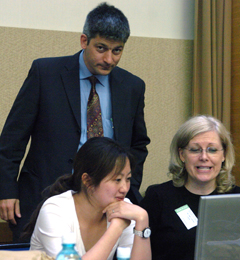 |
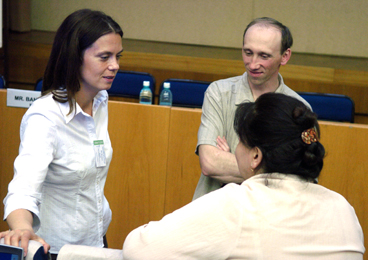
|
| |
|
Ke Du, Global Environment Institute, China, Stuart Wilson, Forest Monitor, and Carole Saint-Laurent, IUCN finalize the statement from civil society (left) and Karin Wessman, WWF, Sweden, and Dmitry Afinogenov, Saint Petersburg Naturalist's Society, Russia (right) |
| |
|
Andrey Sergeevich Zakharenkov, Research Institute of Forestry, DalNILH, Russia (right) |
| Joint Session on Consolidated Issues Paper, including statement of civil society |
| |
| Victor Teplyakov, IUCN, Evgeny Kuzmichev, FOREST Project, Russia, and Co-Facilitators Jürgen Blaser and Jag Maini |
| |
Evgeny Kuzmichev, FOREST Project, Russia (second from left) , explained government delegates' reactions to the paper on the indicative list of actions, noting that concern was expressed on the structure of the actions paper. He also noted that governments debated whether to rank the list of issues, and that certain elements captured in the actions paper should be included in a preamble to the text.
Victor Teplyakov, IUCN (left), reported on his group's discussion, noting the often divergent views of civil society and governments. He indicated that the group proposed supplemental action points, including on the definition of illegal logging and utilization of logs, data, information and transparency, and legislation and institutions. |
|
|
Ke Du, Global Environmental Institute, China, voiced stakeholders' support to the ENA FLEG process, expressed the conviction that input from civil society will benefit dialogue with governments, and called for clarifying arrangements for stakeholder participation in the Ministerial Conference. |
|
|
|
|
|
|
|
Andrey Kushlin, World Bank, Valery
Roshupkin, Head of Federal Forestry Agency, Russian Ministry of Natural Resources, and Gerhard Dieterle, World Bank |
|
|
Jurgen Blaser and Gerhard Dieterle (right) explained that the Ministerial Conference, tentatively scheduled for 22-25 November 2005, will comprise two and a half days of technical discussions and negotiations, include a ministerial segment, as well as parallel events organized by various stakeholders. They said revised text is expected to be put on the website by 5 August, and thus be available in the public domain. |
Valery Roshupkin, Russian Ministry of Natural Resources, thanked all participants for the important work done, highlighting valuable input from civil society and the private sector, which will serve as a basis in preparing the Ministerial Conference. He also said that FLEG issues will be taken forward during Russia 's upcoming G8 Presidency. In closing, he invited all participants to St. Petersburg and closed the meeting at 16:45 . |
| Meeting of the International Steering Committee |
| |
| Andrey Kushlin, World Bank, Valery
Roshupkin, Head of Federal Forestry Agency, Russian Ministry of Natural Resources, and Gerhard Dieterle, World Bank |
| |
|
|
|
|
|
 |
Relevant links |
 |
|
|

© 2005,
IISD. All rights reserved.
|